Reading view
The Best Way to Preserve U.S. Steel Is to Approve Its Sale
Who is Magdeburg market attack suspect Taleb al-Abdulmohsen?

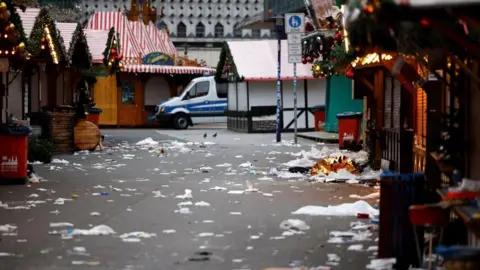 Reuters
ReutersOn Friday evening, a man ploughed a car into a crowd of shoppers at a Christmas market in the German city of Magdeburg.
The attack has left five people dead and more than 200 injured, with many in a critical condition.
One man has been arrested over the attack, and police believe he was solely responsible.
German Chancellor Olaf Scholz travelled to Magdeburg on Saturday, and a city councillor declared Christmas over for the city.
How did the attack unfold?
Unverified footage on social media showed a black BMW travelling at high speeds through the pedestrian walkway between Christmas stalls.
Eyewitnesses described jumping out of the car's path, fleeing or hiding. One told the Reuters news agency that police were already at the venue and chased after the car before arresting the suspect.
Footage from verified sources showed armed police confronting and arresting a man who can be seen lying on the ground next to a stationary vehicle - a black BMW with significant damage to its front bumper.
BBC correspondent Damien McGuinness in Magdeburg reported that the market is "surrounded by concrete blocks". However, "there is a gap which is wide enough for pedestrians to go through, but tragically wide enough for a car to go into the Christmas market", he said.
City officials said around 100 police, medics and firefighters, as well as 50 rescue service personnel rushed to the scene in the aftermath of the attack.
Images from the scene on Friday night showed an area outside the market awash with blue lights as dozens of first responders attended to the injured.
Who are the victims?
Five people have died in the attack, one of whom is a child.
More than 200 people have been injured and at least 41 are in a critical condition.
The toll had earlier been reported as two dead and 68 injured, but was revised to the much higher totals on Saturday morning.
None of the victims have been identified yet.

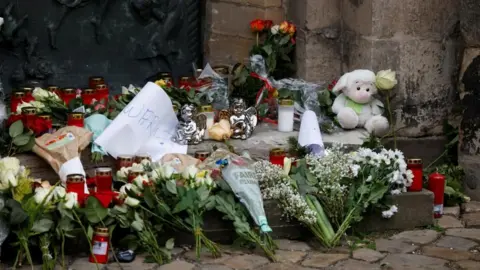 Reuters
ReutersWho is the suspect?
German media has identified the suspect as Taleb A, a psychiatrist who lives in Bernburg, around 40km (25 miles) south of Magdeburg.
The motive behind the attack remains unclear, but authorities have reported that they believe he carried out the attack alone.
Originally from Saudi Arabia, he arrived in Germany in 2006 and in 2016 was recognised as a refugee.
He ran a website that aimed to help other former Muslims flee persecution in their Gulf homelands.
Evidenced by social media posts, the suspect is an outspoken critic of Islam, and has promoted conspiracy theories regarding a plot to seek Islamic supremacy in Europe.
A report from Der Spiegel said a complaint was filed against Taleb A with the authorities a year ago over statements he made. Officials did not see any concrete threat, the report says.
What have officials said about the attack?
"The reports from Magdeburg raise the worst fears," the German chancellor, Olaf Scholz, said on social media platform X.
Magdeburg's city councillor for public order, Ronni Krug, said the Christmas market will stay closed and that "Christmas in Magdeburg is over", according to German public broadcaster MDR.
That sentiment was echoed on the market's website, which in the wake of the attack featured only a black screen with words of mourning, announcing that the market was over.
The Saudi government expressed "solidarity with the German people and the families of the victims", in a statement on X, and "affirmed its rejection of violence".
UK Prime Minister Sir Keir Starmer said he was "horrified by the atrocious attack in Magdeburg", adding that his thoughts were with "the victims, their families and all those affected" in a post on X on Friday night.
Grief and anger in Magdeburg after Christmas market attack

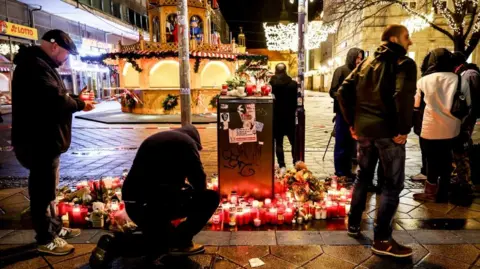 EPA
EPAMagdeburg's Christmas market is a sad sight. This should have been the busiest weekend of the season, but the whole area has been cordoned off and all the stands are shut.
Police are the only people walking around the boarded-up mulled wine and gingerbread stalls.
On the pavement, red candles flicker, tributes laid for the victims.
Lukas, a truck driver, told me he felt compelled to come to pay his respects. "I wasn't there when it happened," he told me.
"But I work here in Magdeburg. I'm here every day. I've driven by here a thousand times."
"It's a tragedy for everyone here in Magdeburg. The perpetrator should be punished."
"We can only hope that the victims and their families find the strength to deal with it."
There is sorrow here – but there is anger too.
Many people here see this attack as a terrible lapse in security. That is a claim the authorities reject, although they have admitted the attacker entered the market using a route planned for emergency responders.
Michael, who also came to pay tributes to the victims, said "there should've been better security".
"We should have been prepared better but that was not done properly."
- Investigation: Police probe market security and warnings about suspect
- Explained: What we know so far about Magdeburg Christmas market attack
- From the scene: Eyewitness heard rumbling and shattering glass
Standing at the security cordon, I heard a group of locals complaining loudly about Germany's Chancellor Olaf Scholz and regional politicians.
"They are wasting our tax money, they are just looking out for themselves. They are not interested in us. We just hear empty promises," one man said.
"They are turning what happened here around and want to put the blame on the opposition and use it for their election campaign," he said.
On Saturday evening, around the same time as the square in front of Magdeburg's Gothic cathedral was filled with mourners watching a memorial service, a demonstration took place nearby.
Protesters held a banner that read "Remigration now!" – a concept popular among the far-right – and shouted "those who do not love Germany should leave Germany".
It is not clear yet what impact this attack may have on Germany's upcoming election.
Germany has been hit by a number of deadly Islamist attacks in the past, but investigators said the evidence they have gathered so far suggests a different picture in this case.
Germany's Interior Minister Nancy Faeser said the suspect appears to have been "Islamophobic".
The suspect, Taleb Al-Abdulmohsen, is from Saudi Arabia, and his social media posts suggest he had been critical of Islam.
He also expressed sympathy on social media for Germany's far-right political party, Alternative for Germany (AfD), re-tweeting posts from the party's leader and a far-right activist.
Another deadly crush in Nigeria at event offering free food

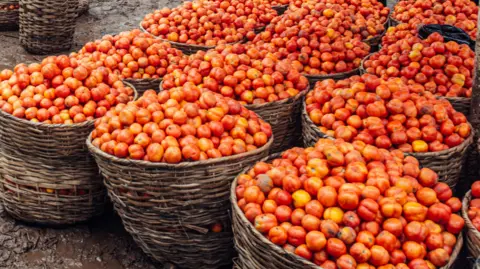 Getty Images
Getty ImagesThe number of dead from a crowd crush in the south-east town of Okija in Nigeria has risen to 22, police say.
It is the third case this week of people being crushed to death at events where free food was being distributed.
The fatalities in Okija occurred at a charity event on Saturday, when residents rushed to collect Christmas donations, including rice and vegetable oil.
On the same day, a similar tragedy at a Catholic church in the capital city Abuja killed 10 people, while 35 children died during a carnival event on Wednesday in the city of Ibadan.
- How offer of free food led to deadly crush at Nigerian Christmas fair
- Is Nigeria on the right track after a year of Tinubu?
Police have now warned organisers to notify authorities before holding charity events in order to prevent such loss of life.
Toyin Abdul Kadri, who witnessed the crush at the Holy Trinity Catholic Church in Abuja, told AFP news agency the attendees "forced the gates and forced their selves inside".
The event involved "vulnerable and elderly individuals" and four children were killed, the police said.
In a social media post about the crushes, Amnesty International Nigeria wrote: "President Bola Tinubu's government must urgently prioritise addressing widespread hunger, higher unemployment and the rapidly falling standard of living."
Food and transportation costs have more than tripled in Nigeria in the last 18 months.
The global bout of inflation has been exacerbated by some of the policies of the government – designed to strengthen the economy in the long-term – such as ending a fuel subsidy.
In a statement on the deadly crushes, President Bola Tinubu said: "In a season of joy and celebration, we grieve with fellow citizens mourning the painful losses of their loved ones. Our prayers of divine comfort and healing are with them."
He urged state governments and the police to enforce strict crowd control measures, and has cancelled all his official engagements in honour of the victims.
He also noted the similarities between the incidents, including one earlier this week in the south-west city of Ibadan.
A crush at a school funfair there killed 35 children and seriously injured six others.
Thousands of people had turned up on the promise of free food.
Residents in Bashorun, a suburb of Ibadan, told the BBC the crowd soon exceeded 5,000 with many attempting to force their way through the school gate. Parents are said to have tried to scale the fence surrounding the compound to gain access.
Police spokesperson Olumuyiwa Adejobi said the three "tragic" incidents highlight the "urgent need for a more structured and effective approach to delivering aid to vulnerable communities and members of the public in general".
More BBC stories about Nigeria:

 Getty Images/BBC
Getty Images/BBCGo to BBCAfrica.com for more news from the African continent.
Follow us on Twitter @BBCAfrica, on Facebook at BBC Africa or on Instagram at bbcafrica
The Differences Between Running a Business and Running the Government
Campus Groups Try to Make Room for Middle-Ground Opinions on the Middle East

© Mark Abramson for The New York Times
Grief and anger in Magdeburg after Christmas market attack

 EPA
EPAMagdeburg's Christmas market is a sad sight. This should have been the busiest weekend of the season, but the whole area has been cordoned off and all the stands are shut.
Police are the only people walking around the boarded-up mulled wine and gingerbread stalls.
On the pavement, red candles flicker, tributes laid for the victims.
Lukas, a truck driver, told me he felt compelled to come to pay his respects. "I wasn't there when it happened," he told me.
"But I work here in Magdeburg. I'm here every day. I've driven by here a thousand times."
"It's a tragedy for everyone here in Magdeburg. The perpetrator should be punished."
"We can only hope that the victims and their families find the strength to deal with it."
There is sorrow here – but there is anger too.
Many people here see this attack as a terrible lapse in security. That is a claim the authorities reject, although they have admitted the attacker entered the market using a route planned for emergency responders.
Michael, who also came to pay tributes to the victims, said "there should've been better security".
"We should have been prepared better but that was not done properly."
- Investigation: Police probe market security and warnings about suspect
- Explained: What we know so far about Magdeburg Christmas market attack
- From the scene: Eyewitness heard rumbling and shattering glass
Standing at the security cordon, I heard a group of locals complaining loudly about Germany's Chancellor Olaf Scholz and regional politicians.
"They are wasting our tax money, they are just looking out for themselves. They are not interested in us. We just hear empty promises," one man said.
"They are turning what happened here around and want to put the blame on the opposition and use it for their election campaign," he said.
On Saturday evening, around the same time as the square in front of Magdeburg's Gothic cathedral was filled with mourners watching a memorial service, a demonstration took place nearby.
Protesters held a banner that read "Remigration now!" – a concept popular among the far-right – and shouted "those who do not love Germany should leave Germany".
It is not clear yet what impact this attack may have on Germany's upcoming election.
Germany has been hit by a number of deadly Islamist attacks in the past, but investigators said the evidence they have gathered so far suggests a different picture in this case.
Germany's Interior Minister Nancy Faeser said the suspect appears to have been "Islamophobic".
The suspect, Taleb Al-Abdulmohsen, is from Saudi Arabia, and his social media posts suggest he had been critical of Islam.
He also expressed sympathy on social media for Germany's far-right political party, Alternative for Germany (AfD), re-tweeting posts from the party's leader and a far-right activist.
Russia executing more and more Ukrainian prisoners of war

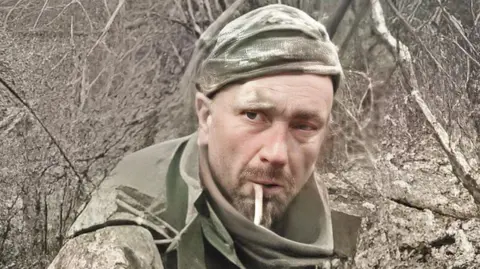 Facebook
FacebookUkrainian sniper Oleksandr Matsievsky was captured by Russians in the first year of the full-scale invasion. Later, a video emerged showing him smoking his last cigarette in a forest, apparently next to a grave he had been forced to dig.
"Glory to Ukraine!" he says to his captors. Moments later, shots ring out and he falls dead.
His execution is one of many.
In October this year, nine captured Ukrainian soldiers were reportedly shot dead by Russian forces in Kursk region. Ukrainian prosecutors are investigating the case including a photo showing half-naked bodies lying on the ground. This photo was enough for one of the victims, drone operator Ruslan Holubenko, to be identified by his parents.
"I recognised him by his underwear," his distraught mother told local broadcaster Suspilne Chernihiv. "I bought it for him before a trip to the sea. I also knew that his shoulder had been shot through. You could see that in the picture."
The list of executions goes on. Ukrainian prosecutors are investigating reports of beheadings and a sword being used to kill a Ukrainian soldier with his hands tied behind his back.
In another instance, a video showed 16 Ukrainian soldiers apparently being lined up and then mowed down with automatic gunfire after emerging from a woods to surrender.

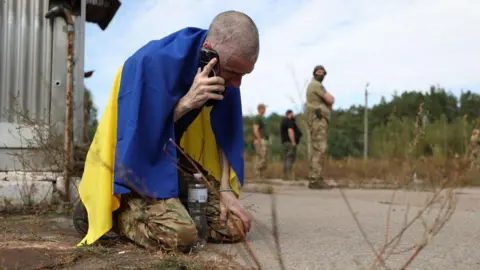 Getty Images
Getty ImagesSome of the executions were filmed by Russian forces themselves, while others were observed by Ukrainian drones hovering above.
The killings captured on such videos usually take place in woods or fields lacking distinctive features, which makes confirming their exact location difficult. BBC Verify, however, has been able to confirm in several cases - such as one beheading - that the victims wear Ukrainian uniforms and that the videos are recent.
Rising numbers
The Ukrainian prosecution service says that at least 147 Ukrainian prisoners of war have been executed by Russian forces since the start of the full-scale invasion, 127 of them this year.
"The upward trend is very clear, very obvious," says Yuri Belousov, the head of the War Department at the Ukrainian Prosecutor-General's Office.
"Executions became systemic from November last year and have continued throughout all of this year. Sadly, their number has been particularly on the rise this summer and autumn. This tells us that they are not isolated cases. They are happening across vast areas and they have clear signs of being part of a policy - there is evidence that instructions to this effect are being issued."
International humanitarian law - particularly the Third Geneva Convention - offers protection to prisoners of war, and executing them is a war crime.
Despite this, Ramzan Kadyrov, the strongman leader of Russia's Chechnya, briefly ordered his commanders involved in the Ukraine war "to take no prisoners".

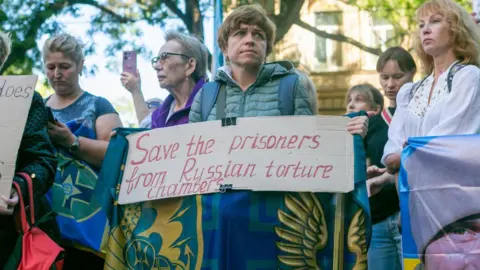 Getty Images
Getty ImagesImpunity
Rachel Denber, Deputy Director of the Europe and Central Asia Division at Human Rights Watch, says there is no shortage of evidence supporting allegations of Ukrainian prisoners of war being executed by Russian troops. According to her, impunity plays a key part, and the Russian army has some serious questions to answer.
"What instructions do these units have, either formally or informally from their commanders? Are their commanders being quite clear about what the Geneva Conventions say about the treatment of prisoners of war? What are Russian military commanders telling their units about their conduct? What steps is the chain of command taking to investigate these instances? And if higher ups are not investigating, or not taking steps to prevent that conduct, are they aware that they too are criminally liable and can be held accountable?" she asks.
So far, there has been nothing to suggest that Russia is formally investigating claims that its forces have been executing Ukrainian prisoners of war. Even mentioning similar allegations is punishable by lengthy prison sentences in Russia.
According to Vladimir Putin, Russian forces have "always" treated Ukrainian prisoners of war "strictly in line with international legal documents and international conventions".
Ukrainian forces have also been accused of executing Russian prisoners of war, but the number of such claims has been much smaller.
Yuri Belousov says that the Ukrainian prosecution service treats such accusations "very seriously" and is investigating them - but so far no one has been charged.
According to Human Rights Watch, since the full-scale invasion began in February 2022 the Russian forces have committed "a litany of violations, including those which should be investigated as war crimes or crimes against humanity".
The Russian army's record of abuses is such that some Ukrainian soldiers prefer death to capture.
"He told me: Mum, I'll never surrender, never. Forgive me, I know you'll cry, but I don't want to be tortured," Ruslan Holubenko's mother says. Her son is still officially classed as missing in action, and she hopes against hope.
"I'll do everything that's possible and impossible to get my child back. I keep looking at this photo. Maybe he is just unconscious? I want to believe, I don't want to think that he's gone."
Archbishop of York 'regrets' abuse scandal priest was reappointed twice

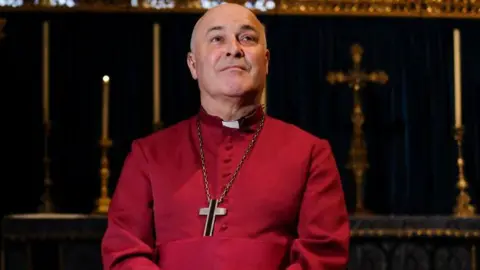 Getty Images
Getty ImagesA Church of England priest at the centre of a sexual abuse case was twice reappointed to a senior role during the Archbishop of York's time as Bishop of Chelmsford, the BBC can reveal.
A BBC investigation previously revealed how David Tudor remained in post nine years after Stephen Cottrell was first told of concerns about him.
New information shows Tudor's contract as area dean in Essex was renewed in 2013 and 2018, at which times Mr Cottrell knew he had paid compensation to a woman who says she was abused by him as a child.
The Archbishop of York said he regrets his handling of the case, with a spokesperson saying "he acknowledges this could have been handled differently".
They added that "all the risks around David Tudor were regularly reviewed" and that was the "main focus".
Rachel Ford, who told the investigation she was groomed by Tudor as a child, said the renewal of his contract as area dean was "an insult to all of his victims".
Ms Ford added that if responsibility for that lay with Mr Cottrell, it strengthened her feeling that he should resign.
The pressure on Mr Cottrell comes at a time of turmoil in the Church of England following a damning report into how it covered up prolific abuse by the barrister John Smyth.
The report led to the resignation of the Church's most senior figure, Archbishop of Canterbury Justin Welby. Mr Cottrell will take over his role temporarily for a few months in the New Year.
The BBC investigation showed Mr Cottrell was briefed in his first week as Bishop of Chelmsford about serious safeguarding issues surrounding Tudor.
These included that Tudor was convicted of indecently assaulting three underage girls and was jailed for six months in 1988, although the conviction was quashed on technical grounds. Mr Cottrell would also have known Tudor served a five-year ban from ministry.
By 2012, Mr Cottrell also knew Tudor had paid a £10,000 settlement to a woman who says she was sexually abused by him from the age of 11. In 2018, the Church of England issued an apology and a six-figure pay-out to another alleged victim.
Yet the priest was suspended only in 2019 when a police investigation was launched after another woman came forward alleging Tudor had abused her in the 1980s.

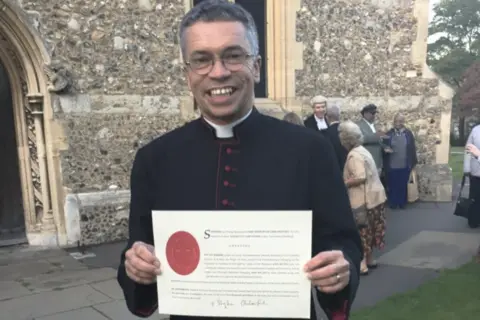 Facebook/Canvey CofE
Facebook/Canvey CofEWhen first responding to the BBC's investigation, the Archbishop of York said he was "deeply sorry that we were not able to take action earlier", insisting he had acted at the first opportunity that was legally available to him.
Mr Cottrell also said he had been faced with a "horrible and intolerable" situation and that it was "awful to live with and to manage".
When Mr Cottrell became bishop in 2010, Tudor was into the second year of a five-year term as an area dean, a role overseeing 12 parishes in Essex.
His appointment to that post, under a different bishop, happened despite him working under a safeguarding agreement that barred him from being alone with children and entering schools.
The title was renewed twice under Mr Cottrell - in 2013 and 2018 - and he lost the title only when the term of office expired in 2020. It was not taken from him.
A spokesperson for the Archbishop said he "accepts responsibility for David Tudor remaining as Area Dean".
"No-one advised him that David Tudor should not continue as an Area Dean," said the Archbishop's office.
Another of Tudor's victims, who does not want to be identified, said she was "shocked and disappointed" to hear his tenure as area dean was twice renewed during Mr Cottrell's time as Bishop of Chelmsford.
"These are not the actions of a bishop dealing with a situation that was intolerable to him, in fact, quite the opposite. I call on him to do the honourable thing for the sake of the Church and resign," she says.
In 2015, under Mr Cottrell, Tudor was also made honorary canon of Chelmsford Cathedral.
The Archbishop's office insisted it happened because of a change in Church policy during Mr Cottrell's time as Bishop of Chelmsford, meaning area deans were automatically made honorary canons.
It was "not a promotion and not a personal reward".
However, a social media post from Tudor's Canvey Island parish in July 2015 suggests it was seen there as a reward.
Tudor's "hard work, determination and commitment to this place have been recognised by the diocese and this new position in the Church is very well-deserved," it said.
The BBC has also seen evidence - in leaked minutes from internal Church meetings in 2018 and 2019 - that Tudor's titles of area dean and honorary canon were discussed and there had been a suggestion Mr Cottrell could immediately have taken them away.
In October 2018, a meeting at Church House - the London headquarters of the Church of England - heard that Chelmsford diocese took the view that if Tudor "can be a parish priest, he can undertake the other roles".
A bishop from another diocese said "the Bishop of Chelmsford could remove DT's [David Tudor's] Canon and Area Dean titles straight away".
But in a follow-up discussion in November 2018, Chelmsford diocese advised it would not be appropriate because of "the difficulty of removing those titles without explaining why."
We asked Mr Cottrell's office why he had not followed the suggestion to remove Tudor's titles. We were told "it would not be appropriate to comment on any notes or decisions from a core group process which are confidential".
The investigation also highlighted the significant role played by former Archbishop of Canterbury George Carey in the case.
We revealed Lord Carey had agreed to Tudor's return to priesthood after being suspended in 1989, and had also agreed to have Tudor's name removed from the list of clergy that had faced disciplinary action. He had also advocated for the priest.
After the BBC put this information to the former Archbishop of Canterbury, he wrote to give up his "permission to officiate", ending more than 65 years of ministry in the Church of England. Lord Carey made the announcement on Tuesday.
In October 2024, Tudor admitted sexual misconduct and was sacked by the Church. At no point has he responded to the BBC's attempts to speak with him.
What we know so far about Magdeburg market attack

 Reuters
ReutersOn Friday evening, a man ploughed a car into a crowd of shoppers at a Christmas market in the German city of Magdeburg.
The attack has left five people dead and more than 200 injured, with many in a critical condition.
One man has been arrested over the attack, and police believe he was solely responsible.
German Chancellor Olaf Scholz travelled to Magdeburg on Saturday, and a city councillor declared Christmas over for the city.
How did the attack unfold?
Unverified footage on social media showed a black BMW travelling at high speeds through the pedestrian walkway between Christmas stalls.
Eyewitnesses described jumping out of the car's path, fleeing or hiding. One told the Reuters news agency that police were already at the venue and chased after the car before arresting the suspect.
Footage from verified sources showed armed police confronting and arresting a man who can be seen lying on the ground next to a stationary vehicle - a black BMW with significant damage to its front bumper.
BBC correspondent Damien McGuinness in Magdeburg reported that the market is "surrounded by concrete blocks". However, "there is a gap which is wide enough for pedestrians to go through, but tragically wide enough for a car to go into the Christmas market", he said.
City officials said around 100 police, medics and firefighters, as well as 50 rescue service personnel rushed to the scene in the aftermath of the attack.
Images from the scene on Friday night showed an area outside the market awash with blue lights as dozens of first responders attended to the injured.
Who are the victims?
Five people have died in the attack, one of whom is a child.
More than 200 people have been injured and at least 41 are in a critical condition.
The toll had earlier been reported as two dead and 68 injured, but was revised to the much higher totals on Saturday morning.
None of the victims have been identified yet.

 Reuters
ReutersWho is the suspect?
German media has identified the suspect as Taleb A, a psychiatrist who lives in Bernburg, around 40km (25 miles) south of Magdeburg.
The motive behind the attack remains unclear, but authorities have reported that they believe he carried out the attack alone.
Originally from Saudi Arabia, he arrived in Germany in 2006 and in 2016 was recognised as a refugee.
He ran a website that aimed to help other former Muslims flee persecution in their Gulf homelands.
Evidenced by social media posts, the suspect is an outspoken critic of Islam, and has promoted conspiracy theories regarding a plot to seek Islamic supremacy in Europe.
A report from Der Spiegel said a complaint was filed against Taleb A with the authorities a year ago over statements he made. Officials did not see any concrete threat, the report says.
What have officials said about the attack?
"The reports from Magdeburg raise the worst fears," the German chancellor, Olaf Scholz, said on social media platform X.
Magdeburg's city councillor for public order, Ronni Krug, said the Christmas market will stay closed and that "Christmas in Magdeburg is over", according to German public broadcaster MDR.
That sentiment was echoed on the market's website, which in the wake of the attack featured only a black screen with words of mourning, announcing that the market was over.
The Saudi government expressed "solidarity with the German people and the families of the victims", in a statement on X, and "affirmed its rejection of violence".
UK Prime Minister Sir Keir Starmer said he was "horrified by the atrocious attack in Magdeburg", adding that his thoughts were with "the victims, their families and all those affected" in a post on X on Friday night.
课间15分钟,如何推广开?
微言教育微信公众号
把课间还给孩子,如何走深走实,有哪些难点堵点?《人民日报》邀请中小学校长,与网友共同探讨课间“微改革”之道,分享育人实践与思考。跟教育小微一起来看——
拖堂、占用等现象时有发生,应把完整课间留给学生
网友留言:
“若有些学校拖堂两三分钟,再提前三五分钟打预备铃,课间真的能有15分钟吗?”
湖南衡阳市珠晖区实验小学副校长罗涛:网友的这种担心是有一定现实基础的。我曾观察到,在一些学校,老师为了完成教学任务,或出于多讲一些知识点的想法,有时会出现拖堂的现象。
今年10月起,我们学校推行课间15分钟,也遇到过难点。个别老师担心教学任务无法完成,或课间管理难度增加,对改革有些犹豫。对此,学校积极引导老师转变观念,认识到课间“微改革”对于学生身心健康发展的益处。同时,学校也提出严格要求:打铃即下课,拒绝拖堂。15分钟课间,1分钟也不应打折。
西安交通大学附属中学校长訾艳阳:改革过程中,统一理念十分重要。西安交大附中兴庆校区从今年11月起实行课间15分钟,首先是逐级统一理念,提高老师们的认识。
其次,学校在各学科组教研时进行了研究,规范教学环节和流程,向课堂45分钟要效益。课间有专人督促,记录未能及时下课的班级,进一步向老师了解情况。
课间与课堂、休息与学习,是有机的整体,让孩子休息好、玩好是教育的重要一环。实践证明,在课间活动得越充分,课堂上思维越活跃、注意力越集中、学习效率越高。“课上课下精神饱满,学习热情高涨”“以前课前常有迟到进教室的学生,如今孩子们的课间更从容了”……这是老师们写下的心声。
北京市海淀区上庄学校校长于海龙:老师是否拖堂,一定程度上与学校的教育理念相关。在我们学校,很少听到“拖堂”这两个字——原因是,学校进行了课程改革,改进了教学方法,有了不一样的课堂样态。我们提倡任务式教学,引导学生在真实问题情境中掌握知识。课堂上,学生自主探究、小组学习的时间多了,老师讲课时间相对减少。这样一来,也就没了拖堂的必要。
长期靠“生拉硬拽”“软磨硬泡”推动孩子学习,对于激发内驱力没好处。我们倡导老师提高课堂效率、用有限时间完成教学任务,而不能靠无限制地投入时间来解决问题。在邀请第三方对学校进行诊断、评价时,“高效课堂”是重要指标,其中就包括考察老师是否占用了孩子们的课余时间、自主时间,并对老师提出建议、做出引导。
强制安排课间活动不利于激发创新意识
网友留言:
“有些学校依然把学生‘圈’在教室。”“希望课间少点‘精心规划’,多增加自由活动时间,不只是排队做各种课间活动。”
于海龙:强制安排课间活动不利于激发创新意识。学校的教育教学工作应当由“管理导向”向“育人导向”转变。机械化管理往往意味着简单、统一,而育人要注重学生的个性化成长。
学生不喜欢“被设计”的课间。课间延长到15分钟后,我们在校园里新投放了许多游戏器材,如脚踩式泡泡机等。投放器材前,我们一般不提前给孩子打招呼。校园里突然“冒”出一个新器材,孩子们有新奇感,就会围在一起主动研究怎么玩。创新,往往在自由、放松的状态下产生。如果束缚太多,很难催生创新。
訾艳阳:学校兴庆校区位于主城区,活动空间确实有限,但我们尽可能地为学生开辟场地。如,操场是立体的,一层、二层是开放式体育馆,三层是田径场,每一层都直接和教学楼相连,学生可以很快到达各个场地。
罗涛:学校、老师、家长对孩子的鼓励引导也很重要。我们学校举办了“全员文体活动”启动仪式、亲子趣味运动周、田径运动会等活动。老师在课间带头走出教室,组织、引导学生活动,并鼓励家长与孩子交流时强调户外活动的好处,培养运动兴趣,共同促进孩子们充分利用课间享受乐趣、增强体质。
厘清权责,共筑校园安全防线
网友留言:
“有的学校以安全为由,除上厕所外,不让孩子出教室。”“有些学校的课间,老师要守着学生活动。班级不安静休息、出现打闹情况,就通报批评。如此防范,是否妥当?”
訾艳阳:安全方面的压力当然是有的,但不能因噎废食。推行课间15分钟前,学校兴庆校区提前对校园各角落进行了多轮安全隐患排查。如今,校领导每天都会在校园中巡查,发现并处理安全隐患。
此外,开展课间活动时,校领导会走出办公室、关注学生课间情况,德育处、教务处等老师会到指定点位进行保障,体育老师也会做好各项运动的专业指导。学校还有志愿服务学生团队,同学们课间会自我管理、自我服务。
与此同时,学校也希望能获得更多家长的支持和理解,以及相关部门在法律层面的保障,完善校园安全事故处理程序,为学校解除后顾之忧。
罗涛:日常安全教育也很重要。如每天放学前1分钟、每周放学前5分钟、每个节假日放假前30分钟,会对学生进行安全提醒和教育,其中就包括关于课间安全的内容。
安全教育可以采取寓教于乐的方式。如我们将安全知识融入飞行棋地面游戏,游戏里的每一步都对应着一个安全知识要点。学生们在课间玩游戏的过程中也能接受安全教育。
于海龙:如果为了避免安全事故,什么运动都不让学生做,这是对教育规律的极大不尊重。
学校刚安装秋千时,不少老师提出反对意见,担心太危险了——磕着碰着怎么办?但是,不能因为这个就不让孩子玩了。
最好的教育是自我教育,要让学生学会自我保护。实践中,学生经过一段适应期后,就有了规则意识。老师也会引导学生在跨学科课程中自主制定秋千使用办法,如,最多几人同时乘坐、测算秋千摇摆的安全距离等。
深化教育评价改革,树立科学的办学导向
网友留言:
“光有课间15分钟还不够。家庭作业多不多?睡眠够不够?主要还是要真正落实‘双减’,不然孩子依然很累。”
訾艳阳:德智体美劳全面发展,字字千金。除了课间15分钟改革,学校兴庆校区还从本学期起,每周在初一年级开设5节体育与健康课程,初二、初三年级开设4节体育与健康课程。我们希望校园更加充满活力、更加人性化、更加有利于学生全面发展,让学生们不仅掌握知识,还提升社交技能,学会如何更好地学习生活,如何在忙碌与休闲之间找到平衡。这是一种自然而健康的育人状态。
我们发现一个有趣的现象:毕业班的学生更懂得合理规划时间。最近,孩子们流行在课间打羽毛球,这一风气恰恰是初三学生带动起来的。我们发现,一些学生特别是初三学生下课后喜欢下楼打羽毛球,学校就购置了一批移动羽毛球网,有时老师也参与。看到学校的鼓励和引导,学生们玩得也更放心、更开心了!
罗涛:近年来,我们严格落实“双减”工作要求,健全作业管理机制。为了增加课间的时间,我们把学校原有的早读时间进行了压缩,目的也是给学生更多自主探索的时间。
未来,期待家庭、社会都能坚持健康第一的教育理念。家长不应过于注重分数,而是要从一生的成长目标来看待教育。注重帮助孩子养成健康成熟的人格、强健的体魄,为一生打好基础。
于海龙:期待深化教育评价改革,树立科学的办学导向。如,改革学校评价,克服重智育轻德育、重分数轻素质等片面办学行为;改革学生评价,树立科学成才观念,坚决改变用分数给学生贴标签的做法。
网络编辑:明非
The Enigma of Bob Dylan

© Bettmann
Russia is executing more and more Ukrainian prisoners of war

 Facebook
FacebookUkrainian sniper Oleksandr Matsievsky was captured by Russians in the first year of the full-scale invasion. Later, a video emerged showing him smoking his last cigarette in a forest, apparently next to a grave he had been forced to dig.
"Glory to Ukraine!" he says to his captors. Moments later, shots ring out and he falls dead.
His execution is one of many.
In October this year, nine captured Ukrainian soldiers were reportedly shot dead by Russian forces in Kursk region. Ukrainian prosecutors are investigating the case including a photo showing half-naked bodies lying on the ground. This photo was enough for one of the victims, drone operator Ruslan Holubenko, to be identified by his parents.
"I recognised him by his underwear," his distraught mother told local broadcaster Suspilne Chernihiv. "I bought it for him before a trip to the sea. I also knew that his shoulder had been shot through. You could see that in the picture."
The list of executions goes on. Ukrainian prosecutors are investigating reports of beheadings and a sword being used to kill a Ukrainian soldier with his hands tied behind his back.
In another instance, a video showed 16 Ukrainian soldiers apparently being lined up and then mowed down with automatic gunfire after emerging from a woods to surrender.

 Getty Images
Getty ImagesSome of the executions were filmed by Russian forces themselves, while others were observed by Ukrainian drones hovering above.
The killings captured on such videos usually take place in woods or fields lacking distinctive features, which makes confirming their exact location difficult. BBC Verify, however, has been able to confirm in several cases - such as one beheading - that the victims wear Ukrainian uniforms and that the videos are recent.
Rising numbers
The Ukrainian prosecution service says that at least 147 Ukrainian prisoners of war have been executed by Russian forces since the start of the full-scale invasion, 127 of them this year.
"The upward trend is very clear, very obvious," says Yuri Belousov, the head of the War Department at the Ukrainian Prosecutor-General's Office.
"Executions became systemic from November last year and have continued throughout all of this year. Sadly, their number has been particularly on the rise this summer and autumn. This tells us that they are not isolated cases. They are happening across vast areas and they have clear signs of being part of a policy - there is evidence that instructions to this effect are being issued."
International humanitarian law - particularly the Third Geneva Convention - offers protection to prisoners of war, and executing them is a war crime.
Despite this, Ramzan Kadyrov, the strongman leader of Russia's Chechnya, briefly ordered his commanders involved in the Ukraine war "to take no prisoners".

 Getty Images
Getty ImagesImpunity
Rachel Denber, Deputy Director of the Europe and Central Asia Division at Human Rights Watch, says there is no shortage of evidence supporting allegations of Ukrainian prisoners of war being executed by Russian troops. According to her, impunity plays a key part, and the Russian army has some serious questions to answer.
"What instructions do these units have, either formally or informally from their commanders? Are their commanders being quite clear about what the Geneva Conventions say about the treatment of prisoners of war? What are Russian military commanders telling their units about their conduct? What steps is the chain of command taking to investigate these instances? And if higher ups are not investigating, or not taking steps to prevent that conduct, are they aware that they too are criminally liable and can be held accountable?" she asks.
So far, there has been nothing to suggest that Russia is formally investigating claims that its forces have been executing Ukrainian prisoners of war. Even mentioning similar allegations is punishable by lengthy prison sentences in Russia.
According to Vladimir Putin, Russian forces have "always" treated Ukrainian prisoners of war "strictly in line with international legal documents and international conventions".
Ukrainian forces have also been accused of executing Russian prisoners of war, but the number of such claims has been much smaller.
Yuri Belousov says that the Ukrainian prosecution service treats such accusations "very seriously" and is investigating them - but so far no one has been charged.
According to Human Rights Watch, since the full-scale invasion began in February 2022 the Russian forces have committed "a litany of violations, including those which should be investigated as war crimes or crimes against humanity".
The Russian army's record of abuses is such that some Ukrainian soldiers prefer death to capture.
"He told me: Mum, I'll never surrender, never. Forgive me, I know you'll cry, but I don't want to be tortured," Ruslan Holubenko's mother says. Her son is still officially classed as missing in action, and she hopes against hope.
"I'll do everything that's possible and impossible to get my child back. I keep looking at this photo. Maybe he is just unconscious? I want to believe, I don't want to think that he's gone."
Syria's minorities seek security as country charts new future

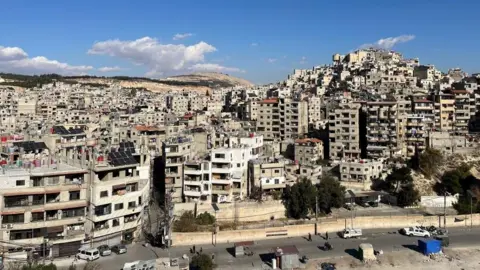 Aamir Peerzada
Aamir PeerzadaDriving into Mezzeh 86, a working-class neighbourhood in the west of Damascus, we are waved through a checkpoint manned by fighters from Hayat Tahrir al-Sham (HTS).
Buildings are rundown and in need of repairs.
This area is dominated by people from Bashar al-Assad's Alawite sect, an offshoot of Shia Islam whose members make up one of Syria's biggest religious minorities.
Alawites controlled power in the predominantly Sunni Muslim country for the 50 years of the Assad family's rule, holding top positions in the government, military and intelligence services.
Now, many from the community fear reprisals following the overthrow of the Assad regime by rebels led by HTS, a Sunni Islamist group that was once al-Qaeda affiliate in Syria.

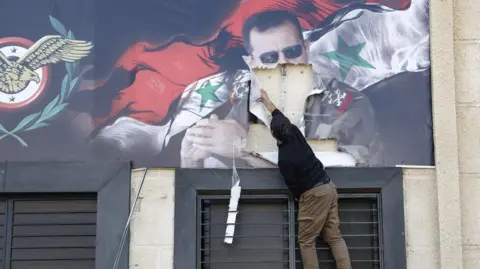 EPA
EPADozens of Alawites who we had contacted by phone had refused to speak to us, with many saying they were scared.
In Mezzeh 86, the presence of HTS fighters at a checkpoint did not appear to be a source of anxiety.
Many Alawites did come up and speak with us - keen to distance themselves from Assad's regime.
"During the Assad regime, the stereotype about the Alawites is that they got all the work opportunities and that they are wealthy. But, in fact, most Alawites are poor and you'll only find one among a thousand who is rich," said Mohammad Shaheen, a 26-year-old pharmacy student.
"Even when HTS went to Alawite villages near the coast, they found all villages were poor. Only the Assad family amassed wealth," he added, referring to the Alawite heartland in the country's west.
Hasan Dawood, a shopkeeper, chimed in: "We were slaves for him - drivers, cooks and cleaners."
There's also a sense of betrayal.
"Bashar was a traitor. And the way he fled was cowardly. He should have at least addressed people and told us what was happening. He left without a word, which made the situation chaotic," said Mohammad.
But people from the Alawite community, and indeed from this neighbourhood, did serve in Assad's brutal security forces. Do they fear reprisals against them, we asked.
"Those who were in the military and did bad things have fled. No-one knows where they are. They are afraid of revenge," said Thaier Shaheen, a construction worker.
"But people who don't have blood on their hands, they are not scared, and have stayed back."
There have been reports of a few reprisal killings in parts of the country, but so far there is no evidence to suggest they were carried out by HTS.
"Until now, we are OK. We are talking to Hayat Tahrir al-Sham and they are respectful. But there are people who aren't from HTS but pretend to be them who are making threats. They want our society to fail and they are the ones we are scared of," said Mohammad.
After taking control of Damascus, HTS and its allies said those from the deposed regime who had been involved in torture and killings would be held to account, although it is unclear so far what form that justice will take.
HTS also said that the rights and freedoms of religious and ethnic minorities would be protected.
The group has a jihadist past which it has distanced itself from. But it has an Islamist present, and many are asking what that will mean for Syria's plural society.

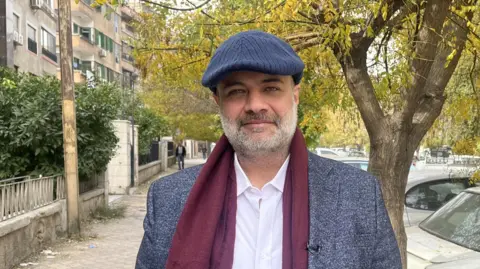 Yogita Limaye
Yogita Limaye"I'm so happy because the Assad regime fell. This is like a dream come true. No-one wants to live under dictatorship. But there is concern. I have to be realistic," said Youssef Sabbagh, a Christian lawyer.
"HTS are here now, and they are an Islamic militia. That's what they are. I wish, I pray they will be a modern Islamic militia."
"I speak not just as a Christian, a lot of Syrians, Muslims and everyone, we don't want Syria to become another Afghanistan, we don't want to become a new Libya. We have already suffered a lot."
Syria's Christian community is one of the oldest in the world, with the country home to some renowned holy sites.
When the uprising against Assad began in 2011, Christians were initially cautious about taking sides, but eventually members from the community fought on both sides of the conflict.
In the past week, the Archbishop of Homs, Jacques Murad, told the BBC there had already been three meetings with HTS, and they had been able to express their views and concerns honestly.
So far, the signs are re-assuring for many Christians.
Bars and restaurants serving alcohol are open in the Christian quarter of Old Damascus and in other parts of the city. Christmas decorations are also up in many places.
At a restaurant in the Old City, we met lawyer Ouday al-Khayat, who is a Shia Muslim.
"There's no doubt that there's anticipation and anxiety. The signs that come from HTS are good, but we must wait and watch," he said.
"It's not possible to know the opinions of all Shia but there is a concern about a scenario similar to Libya or Iraq. I believe, though, that Syria is different. Syrian society has been diverse for a very long time."

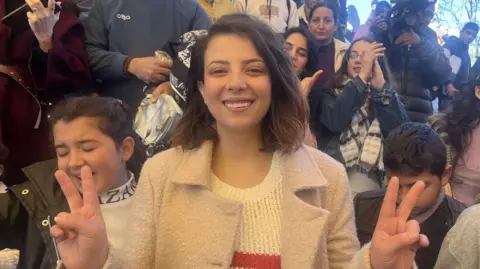 Yogita Limaye
Yogita LimayeWe drove around 110km (70 miles) south-east of Damascus, through black volcanic hills, to the city of Suweida, which is home to most of Syria's Druze population.
The Druze faith is another offshoot of Shia Islam, but has its own unique identity and beliefs.
Many Druze were loyal to the Assad regime, who they believed would protect minorities.
But opposition grew steadily during the war, and there were frequent protests in recent years.
The latest started in Suweida's central square in August 2023 and continued until the day the regime fell.
Activist Wajiha al-Hajjar believes that the protests were not brutally cracked down on like others in Syria, because Assad wanted to show the world and his foreign allies that he was protecting minorities.
"They did try to suppress our protest but in a different way - not through weapons or shelling, but by depriving us of passports and civil rights, and access to official documents. It became difficult to leave Suweida and a kind of siege was imposed," she said.
Hundreds still gather at the square every day. When we visited, there was an air of celebration. Songs were blaring on a loudspeaker, and young girls and boys were doing a gymnastics performance, their families clapping and cheering for them.
"We are celebrating the fall of the regime, but this gathering is also a show of strength. In the event that there is an extreme regime with extreme laws, we are prepared to stay in this square and demand our rights and demand equality," Wajiha said.
Suweida had a quasi-autonomous status under Assad, and the Druze want that to continue.
It is just one example of the diversity and complexity of Syrian society, and the challenges facing the country's new government.
Additional reporting by Aamir Peerzada, Leen Al-Saadi and Sanjay Ganguly
US warplane shot down in Red Sea 'friendly fire' incident

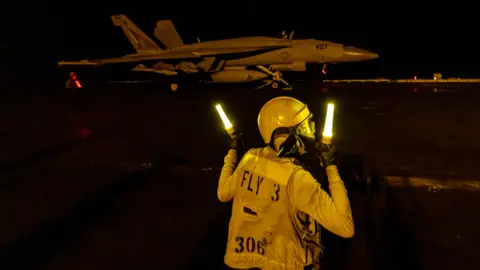 Getty Images
Getty ImagesThe US military says it has carried out a series of air strikes on the Yemeni capital Sanaa targeting a missile storage site and command facilities operated by Iran-backed Houthi militants.
US Central Command added it also hit multiple Houthi drones and an anti-ship cruise missile over the Red Sea.
It comes hours after the Houthis fired a ballistic missile at Israel which injured more than a dozen people in a Tel Aviv park.
The Houthis, an Iran-backed rebel group that controls north-western Yemen, began attacking Israel and international shipping shortly after the start of the Gaza war in October 2023, saying they were acting in solidarity with Palestinians.
In a statement, the US military's Central Command said the strikes aimed to "disrupt and degrade Houthi operations, such as attacks against US Navy warships and merchant vessels in the Southern Red Sea, Bab al-Mandeb, and Gulf of Aden".
The US military also said it struck "multiple Houthi one-way attack uncrewed aerial vehicles, or drones, and an anti-ship cruise missile over the Red Sea".
American F/A-18 Hornet fighter jets were used in the operation, the US Central Command added.
Since November 2023, Houthi missile attacks have sunk two vessels in the Red Sea and damaged others. They have claimed, often falsely, that they are targeting ships only linked to Israel, the US or the UK.
Last December, the US, UK and 12 other nations launched Operation Prosperity Guardian to protect Red Sea shipping lanes against the attacks.

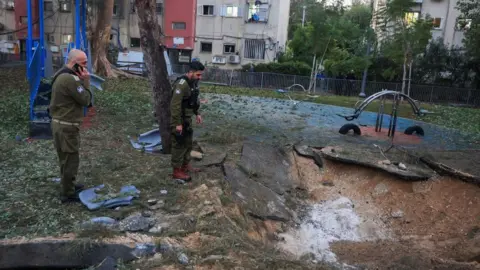 Reuters
ReutersOn Saturday, Israel's military said its attempts to shoot down a projectile launched from Yemen were unsuccessful and the missile struck a park in Tel Aviv.
Magen David Adom (MDA), Israel's emergency medical service, said it treated 16 people who were "mildly injured" by glass shards from shattered windows in nearby buildings.
Another 14 people suffered minor injuries on their way to protected areas were also treated, it said.
A Houthi spokesman said the group hit a military target using a hypersonic ballistic missile.
Earlier this week, Israel conducted a series of strikes against what it said were Houthi military targets, hitting ports as well as energy infrastructure in the Yemeni capital Sanaa.
Houthi-run Al Masirah TV reported that nine people were killed in the port of Salif and the Ras Issa oil terminal.
The Houthis have vowed to continue their attacks until the war in Gaza ends. The US says its latest strike is part of a commitment to protect itself and its allies.
2 US Navy pilots shot down over Red Sea in apparent ‘friendly fire’ incident, US military says


© Bernat Armangue/AP
美国军舰红海误击己方战机
2024-12-22T09:29:01.683Z

(德国之声中文网)美国中央司令部(CENTCOM)周六晚间宣布,一架F/A-18超级大黄蜂战斗机在从航空母舰“哈里·杜鲁门”号(USS Harry S. Truman)起飞后,被己方导弹巡洋舰“葛底斯堡”号(USS Gettysburg)“误击”后坠毁。这架飞机属于弗吉尼亚州大洋娜海军航空站第11攻击战斗机中队“红色裂缝者”。
美军声明指出,事故发生在周六上午,飞机起飞后不久即被巡洋舰发射的导弹击中。两名飞行员紧急弹射逃生,其中一人受轻伤。

事故调查已展开
目前尚不清楚“葛底斯堡”号如何将己方战机误认为敌机或导弹。由于战斗群中的舰艇通过雷达和无线电通信保持联系,此类失误极为罕见。CENTCOM表示,已启动全面调查,以查明事故原因。
事故发生时,美国军方正对也门首都萨那附近的胡塞武装目标展开空袭。此前,胡塞武装曾向以色列商业中心特拉维夫发射导弹,导致多人受伤。美军还击落了胡塞武装发射的多架无人机和反舰巡航导弹。
红海局势持续紧张
过去一年中,红海地区军事活动显著增加。胡塞武装以支持巴勒斯坦为由,持续袭击商船,自2023年10月加沙战争爆发以来,已攻击约100艘商船,并击沉两艘,造成四名船员死亡。胡塞武装还多次向以色列发射导弹和无人机,招致以色列空袭报复。
美国和欧洲自去年底派遣舰队巡逻红海,以确保航运安全。今年初,美国“艾森豪威尔”号航母战斗群曾经历二战以来最激烈的作战行动。
(法新社,美联社,德新社,路透社)
© 2024年德国之声版权声明:本文所有内容受到著作权法保护,如无德国之声特别授权,不得擅自使用。任何不当行为都将导致追偿,并受到刑事追究。
特朗普:巴拿马运河若不降费则应归还美国
2024-12-22T11:31:43.823Z

(德国之声中文网)美国候任总统特朗普周六晚在社交媒体上抨击巴拿马运河的高昂通行费,并要求巴拿马降低费用,否则应将运河归还美国。他在其社交媒体平台Truth Social上发文称:“我们的海军和商业船只被不公平且不合理的方式对待,巴拿马收取的费用简直荒谬。”
巴拿马运河是全球重要的航运通道,允许船只避开绕经南美洲的长途航线。运河由美国主导修建,于1914年正式启用,并在2016年完成扩建,以适应更大型船只的通行。每天有30至40艘船只通过,每年约有14,000艘船只利用这条重要的水路。特朗普的言论发表后,巴拿马方面尚未对此做出正式回应。
特朗普提到中国影响力
特朗普警告称,巴拿马运河不应落入“错误的手中”,他特别提到对中国接管的担忧。他在帖子中写道:“运河的存在不是为了让其他人受益,而是作为我们与巴拿马合作的象征。如果这种宽宏大度的行为所依据的道德和法律原则未能被遵守,那么我们将要求巴拿马无条件地、完整地归还运河。”
目前,巴拿马运河由巴拿马运河管理局负责,该机构是巴拿马政府的独立机构。同时,香港的一家公司管理着巴拿马运河两端的港口,而中国国有企业正在投资运河周边的基础设施。然而,没有任何中国政府或企业直接参与运河通航业务的管理。

美国是运河最大客户
巴拿马运河的修建主要由美国完成,美国也在运河区域进行了长达数十年的管理。直到1999年,运河的所有权才完全移交给巴拿马。巴拿马政府对使用运河的船只收取通行费,费用根据船只的大小和用途而定。
巴拿马运河连接着大西洋和太平洋,约占全球5%的总海运量。美国是巴拿马运河的最大客户,其次是中国和日本。今年10月,巴拿马运河管理局宣布,在刚刚结束的财政年度中创下近50亿美元的收入新纪录。
(路透社,法新社)
© 2024年德国之声版权声明:本文所有内容受到著作权法保护,如无德国之声特别授权,不得擅自使用。任何不当行为都将导致追偿,并受到刑事追究。
Germany Searches for Motives in Christmas Market Attack

© Christian Mang/Reuters
A Picturesque New England Town’s Debt to the Right Whale

© Grade Solomon for The New York Times
U.S. Fighter Jet Shot Down Over Red Sea by Apparent Friendly Fire

© Bernat Armangue/Associated Press
仍有大量叙利亚人失踪 监狱里发生了什么?
被关押在阿萨德的监狱中的数千名叙利亚人重获自由。人权组织称超过1.5万人在狱中被虐待致死。DW跟随一位昔日囚犯重返大马士革安德拉监狱。
保障劳工权益 墨西哥推出“椅子法”
2024-12-22T11:10:06.861Z

(德国之声中文网)墨西哥劳工法进行改革后,工作岗位配备座椅将是墨西哥劳工的一项权益。迄今为止,在某些行业,如超市收银员等都需要长时间站着工作。
随着“椅子法”获得通过,这一状况将出现改观。按照新规定,今后服务行业、零售业或类似工作岗位,都需提供足够的座椅,以保障员工“定期休息”的需求。该法律规定,雇主必须为员工提供有靠背的座椅。

墨西哥议员玛卡多( Patricia Mercado)表示,这项法律改革强化了员工要求改善工作条件的权力。她在X平台上发文指出:“最重要的是,雇主今后不能再将全天站立工作作为员工入职的先决条件。” 新法中还明确规定,雇主今后不得强迫员工长时间站立,更不能禁止员工定期坐下休息。
除了须向员工提供座椅之外,新版劳工法还包括一些其他内容。例如,雇主不得对工会团体进行检查和监控。员工面临解职等处分时,有权在八天的期限内提出申诉。
修正后的劳工法已经以公文形式正式发布。雇主将有六个月时间,即在明年六月前,根据新法要求,完成对企业章程和设施的相应调整。
(德广联)
© 2024年德国之声版权声明:本文所有内容受到著作权法保护,如无德国之声特别授权,不得擅自使用。任何不当行为都将导致追偿,并受到刑事追究。
德国:八百多囚犯获得圣诞特赦
2024-12-22T11:12:26.228Z

(德国之声中文网)圣诞节前夕,将有数百名囚犯结束牢狱生活、重返社会和家庭。德新社对各联邦州司法部门进行问询之后,得出了上述结论。不过,由于多个联邦州批准的特赦案例都有所减少,因此今年获得所谓圣诞特赦的囚犯人数,总数要少于去年。
特赦人数最多的是北威州。根据杜塞尔多夫北威州司法部提供的信息,今年将有248名囚犯提前获释。去年12月中旬,北威州获释的囚犯人数则为322人。巴符州则有160多人获得圣诞特赦,而去年这里获特赦的人数则为218人。
全德范围内,根据圣诞特赦的规定,今年将共有大约八百多名囚犯得以提前离开监狱。大多数被特赦者来自黑森州(104人),柏林(97人),莱法州(大约70)以及下萨克森州(46人)。

不过,并非所有联邦州都有圣诞特赦的规定,比如巴伐利亚州就从未有过圣诞特赦的先例。
全德范围内,去年共有上千人获得特赦。而往年还曾有过囚犯拒绝特赦的案例。根据官方统计,2023年在监狱中服刑中的囚犯共有44000多人。
不过,提前释放也是有先决条件的。要想获得圣诞特赦,当事人必须在监狱中有良好表现,原定释放日期本来就在一月初,以及原刑期不得超过两年。
为什么会有特赦规定?
在谈到圣诞特赦的意义时,黑森州司法部长海因茨表示:“同家人共度圣诞节,是让囚犯重返社会的重要一步。”此外,圣诞节前获释,也有利于当事人在节前争取获得援助,并完成相关的行政手续。 (德新社)
© 2024年德国之声版权声明:本文所有内容受到著作权法保护,如无德国之声特别授权,不得擅自使用。任何不当行为都将导致追偿,并受到刑事追究。
马堡袭击案嫌犯被拘留 更多细节曝光
2024-12-22T10:50:21.068Z

(德国之声中文网)在德东城市马格德堡的圣诞市场于周五(12月20日)发生汽车袭击事件后,警方周日表示,马格德堡地方法院以五项谋杀罪、多项谋杀未遂罪和多项严重人身伤害罪下令对这名50岁的男子进行审前拘留。
由嫌犯驾驶的汽车周五晚间以极高的车速撞向圣诞市场上的人群。据当局表示,有四名妇女和一名九岁男童丧生。另有约200人受伤。其中许多人的伤势严重或极为严重,因此不排除死亡人数将继续增加。
动机仍待调查
嫌犯Taleb A.是一名来自马格德堡周边小城贝尔恩布尔格(Bernburg)的医生,为沙特阿拉伯裔,自2006年起居住在德国,对伊斯兰教持批判立场。
首席检察官诺潘斯(Horst Walter Nopens)表示,嫌犯的动机可能是不满德国的难民待遇。在社群媒体上,被捕者以伊斯兰教和沙特阿拉伯政权的批判者自居。此外,他也为来自保守国家的妇女争取权益。

对德国政府和警方不满
在社交媒体和访谈中,Taleb A.最近对德国当局提出了指控,其中一些指控的表达方式很混乱,指责德国在打击伊斯兰主义等方面做得不够。根据德新社的报导,嫌犯自称曾是穆斯林,但现在已经放弃了伊斯兰信仰。2016年2月,他以受政治迫害者身份在德国申请庇护,同年7月获得批准。
就在大约十天前,自称为反穆斯林草根组织的美国平台「RAIR」发表了对这位医生的访谈。其中,他指责德国警方毁掉了已放弃伊斯兰信仰的沙特裔寻求庇护的生活。 Taleb A.还以X平台拥有者马斯克的粉丝自居,而马斯克现在不仅代表了美国右翼的立场,他也为德国极右翼的另类选择党(AfD)发声。但与此同时,马斯克形容自己在政治上是左倾。
悼念和心理支持
星期六晚上,数百人参与了于马格德堡大教堂举办的悼念仪式,参加者包括受难者家属、救难人员以及政府官员。一般民众也能透过教堂前的萤幕观看仪式。当天傍晚,马格德堡市中心的悼念活动中夹杂着右翼口号。据警方表示,超过2000名参与者聚集在中央广场,警方已对几起轻微骚乱事件涉事者启动刑事程序。

除了针对袭击案件的法律程序之外,另一个迫切的任务是为伤者和受惊吓的目击者提供支持。负责恐怖主义犯罪受害者和幸存者关切的联邦政府专员寇柏(Pascal Kober)向《德国编辑部网络》表示,这种经历会造成巨大的心理压力,「若计入目击者和第一线救助者,受影响的人数就会增加到三位数以上」。
有关安全措施的争论
据马格德堡警方报告,犯罪嫌疑人驾车从逃生救援通道进入圣诞市场,再从紧急通道离开。因此,相关单位是否做足了防护措施也是讨论焦点。德国一位研究极端主义的专家申德勒(Hans-Jakob Schindler)指出,众所周知,车辆和人群聚集是非常危险的组合,他认为「很难解释为什么车辆能够闯入德国的圣诞市集」。

难以未雨绸缪
对于是否能提前预防此类事件发生,德国联邦刑事调查局(BKA)局长明希(Holger Münch)表示,与过去类似罪行不同的是,没有证据显示袭击的动机是基于伊斯兰教。恐怖主义专家诺伊曼(Peter Neumann)表示,嫌犯并不符合任何特定的模式。他说:「他不是典型的伊斯兰教徒,而是一个反对伊斯兰教的沙特人。对当局来说,这并不符合常见的模式。」况且,如今有成千上万的人在网上传递类似的讯息。诺伊曼指出:「要区分谁是认真的,谁只是在网路上胡闹,是相当困难的。」
(德新社、法新社)
©2024年德国之声版权声明:本文所有内容受到著作权法保护,如无德国之声特别授权,不得擅自使用。任何不当行为都将导致追偿,并受到刑事追究。
如何遏制越南人口走私?
2024-12-22T11:07:54.251Z

(德国之声中文网)Nam(化名)不得不等待 12 年才从欧洲回到越南的父母身边。此前他在德国非法居留,缺乏自由旅行所需的证件。
2012 年,Nam决定到欧洲碰碰运气,希望过上更好的生活。
当时他 20 岁,和家人借钱支付给蛇头。
Nam 经俄罗斯偷渡到德国,过着“裸人”的生活——在 Facebook 上越南聊天群中,这一名词专指非法移民。
在这样的聊天群组中,人们可以匿名提问,包括有关获得医疗保健、出国旅行、结婚和离婚的问题。
并非个例
Nam 的故事并非个例。近些年来从越南到欧洲的人口走私已成为一个颇为显著的问题,尽管其严重程度尚不明确。
欧洲有关部门正在打击蛇头团伙,但尚未取得完全的成功。
2019 年 10 月,在一辆停在英国埃塞克斯郡工业区外的冷藏卡车中,发现39 名窒息而死的越南公民。越南人口走私问题由此凸显。
据信,其中几名受害者到欧洲是从事强迫劳动。
作为回应,欧盟与欧洲刑警组织、国际刑警组织合作,于 2021 年加大对人口走私的关注力度。在德国,联邦刑事局启动了一项为期四年的研究项目,以更好地了解涉及越南公民的蛇头网络和方法。
联邦刑事局在分析中发现,男女受害者遭受的虐待各不相同,男性通常面临劳动剥削,而女性遭受性剥削的可能性则要大得多。

沉默带来的困难
该执法机构表示,受害者通常保持沉默,这也是外界对这些犯罪知之甚少的原因之一。例如,联邦刑事局研究样本中的越南受害者没有一人提出指控,这令人惊讶。
“受害者遭受了非常严重的侵犯,即人权被侵犯。但受害者自身似乎并不这样看”,联邦刑事局有组织犯罪、经济犯罪和网络犯罪研究部门的研究员科尼留斯( Tanja Cornelius) 向德国之声表示。
联邦刑事局首席专员鲍曼( Nicole Baumann) 调查人口走私 20 多年,她说,受害者的沉默带来了挑战。“如果没有受害者的陈述,刑事诉讼几乎不可能进行。”
因此,许多犯罪案例仍未曝光,也未受追究。
受害者的动机
科尼留斯指出受害者极为特别的境况。
犯罪心理学研究表明,受害者比蛇头更害怕被司法部门立案,因为担心自己所有的金钱和努力付诸东流。
“他们可能认为,刚开始要过几年非常艰难困苦的日子,”鲍曼说。他们努力工作,并保持低调,希望尽快还清债务并拿到“身份”。她指出,这对犯罪者有利,因为他们也不希望引起注意。
对许多受害者来说,偷渡欧洲是一个机会。因此他们借了大笔的钱,冒着很大的风险踏上前往德国的路途。
据政府提供的数据,蛇头对每个偷渡者收取 10000 至 23000 欧元费用。鉴于该东南亚国家的人均月收入仅为 190 欧元左右,这是一个相当高的数字。
巨额资金和高风险似乎并没有阻止许多越南人,因为他们仍愿付出代价,认为为了实现更好生活的梦想,这是值得的。
偷渡的社会因素
同侪压力也起着一定的作用。
如今在越南许多地方,高楼大厦、模仿欧洲建筑风格的别墅林立。它们被称为“越南盾亿万富翁村”,那里的许多居民通过劳务输出和外国汇款致富。
由于不少人在国外工作,这些地方也获得了“首尔”或“欧洲”等绰号。
来自这些所谓“富豪村”的越南年轻人,如 Nam,面临着来自家庭和整个社会的强大压力:他们必须取得成功,就像其他成功移民到欧洲的人一样。
一些越南蛇头或者办理工作签证的中介机构还利用社交媒体传播豪车、奢侈旅行或名牌服装的图片,对人们进行心理影响。
“财富在社交媒体上传播,这也制造了一种虚假的印象。几乎没有失败者的信息,”鲍曼说。
社会因素也在确保受害者保持沉默上发挥着作用。成功的压力导致越南受害者不愿分享自己的失败或挣扎,包括恶劣的工作条件或性剥削。
有些人愿意忍受任何艰辛来养家糊口。
然而,2019 年埃塞克斯案件是一个转折点。悲剧发生后,几名人口走私受害者匿名分享了他们的故事。这一案件虽然引起媒体大量报道,但关注度随后逐渐降低。
总体而言,在涉及越南公民的人口走私案件中,暴力被认为起着次要作用,犯罪者通常依靠社会压力和家庭期望,而不是威胁和恐吓。
相关图集:无视“城管”的越南街头理发师
 为了“衣冠楚楚”:
越南人普遍注重穿着,讲究卫生,因此对他们来说合适、美观的发型很重要。哪里有需求,哪里就必然就有市场。例如街头理发的生意始终“禁而不止”。
为了“衣冠楚楚”:
越南人普遍注重穿着,讲究卫生,因此对他们来说合适、美观的发型很重要。哪里有需求,哪里就必然就有市场。例如街头理发的生意始终“禁而不止”。
 也负责刮胡子:
越南人经常去理发。有些男人一周要几次去刮胡子。
也负责刮胡子:
越南人经常去理发。有些男人一周要几次去刮胡子。
 清洁耳垢服务:
配戴着头灯和专用工具的街头理发师,还为顾客提供清洁耳垢这项服务。
清洁耳垢服务:
配戴着头灯和专用工具的街头理发师,还为顾客提供清洁耳垢这项服务。
 移动摊位:
通常,街头理发师总是在同一个地方设置“理发摊”,这样有助于不丢老顾客。但是,如果某个地区的“城管”查得严,只能尽快该换一个新位置。
移动摊位:
通常,街头理发师总是在同一个地方设置“理发摊”,这样有助于不丢老顾客。但是,如果某个地区的“城管”查得严,只能尽快该换一个新位置。
 非正规行业:
像四分之三的越南人一样,街头理发师不属于正规的理发行业。他们的工作没有在任何一个地方登记注册,也没有任何一个部门负责监管。他们不缴税,没有任何社会保障。
非正规行业:
像四分之三的越南人一样,街头理发师不属于正规的理发行业。他们的工作没有在任何一个地方登记注册,也没有任何一个部门负责监管。他们不缴税,没有任何社会保障。
 男人的生意:
正如图中所看到的,街头理发师及其顾客都是男性。越南妇女喜欢去真正的理发店。估计是因为在理发店可以洗头,而且能避免好奇路人的窥视。
男人的生意:
正如图中所看到的,街头理发师及其顾客都是男性。越南妇女喜欢去真正的理发店。估计是因为在理发店可以洗头,而且能避免好奇路人的窥视。
合法移民途径
联邦刑事局官员科尼留斯和鲍曼强调,其项目和研究绝不是要将一个社群定罪化。
大多数来自越南的移民都是合法的,而且受到欢迎。由于德国社会老龄化,需要来自越南有专业技能的劳动力。
鉴于对越南劳动力的需求,两国政府新近签署了一项协议,以促进技术移民。
Nam 说,总会有少数人会尝试非法途径。
在一些案例中,在非法的情况下,“他们不需要学习德语,更重要的是,他们可以立即赚更多的钱。对于一些来自经济较差的村庄、受教育程度较低的越南人来说,他们觉得这样的决定是对的”,Nam 说道。
如何遏制人口自私?
打击人口走私需要全社会的努力,越南和德国的官员需要密切合作。
越南刚刚发布了《2023 年移民概况》报告,已与国际刑警组织等全球机构合作,并考虑加入与《联合国打击跨国有组织犯罪公约》相补充的《打击陆、海、空偷运移民走私议定书》,以促进边境管理合作,打击和预防跨国犯罪。
鲍曼强调,教育和普及知识仍然是关键,特别是面向那些可能成为人口走私受害者的人群。这位官员指出,只有了解在德国非法移民的真实处境,个人和家庭才能做出正确的决定。
有合法的移民方式,越南公民可以向德国驻越南大使馆了解。这可能更耗时,但是一种更安全的选择。
© 2024年德国之声版权声明:本文所有内容受到著作权法保护,如无德国之声特别授权,不得擅自使用。任何不当行为都将导致追偿,并受到刑事追究。